

10 Ways Humans Impact the Environment. We as humans have become dependent on luxuries such as cars, houses, and even our cell phones.
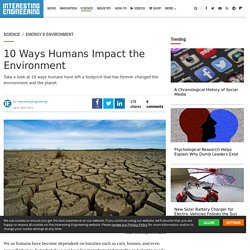
Marine heatwaves to get stronger and more common. New international research shows marine heatwaves are becoming more common and likely to get much stronger.

Marine heatwaves - like the one experienced in New Zealand last summer - are likely to become more frequent and hurt marine ecosystems. Photo: 123RF Marine heatwaves are smaller and more rapid changes in sea temperature that occur during hot weather. New Zealand experienced one last summer. The research, published in Nature Climate Change, shows the heatwaves are 54 percent more common internationally than they were 75 years ago. And they are likely to become more frequent and hurt marine ecosystems. One of the researchers, Dr Mads Thomsen from the University of Canterbury, said marine heatwaves were first recorded in New Zealand during last year's record-breaking summer. Dr Thomsen said more research was needed to understand their impact on marine ecosystems here.
Early evidence suggested rapid changes to local marine systems, including plankton, fish and kelp, he said. Warmer waters. Quick! Save the Planet: We must confront climate change. EDITORIAL: Despair isn't the worst reaction to climate change.
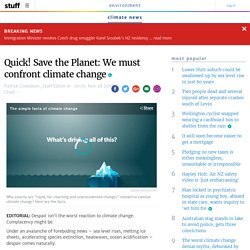
Complacency might be. Under an avalanche of foreboding news – sea level rises, melting ice sheets, accelerating species extinction, heatwaves, ocean acidification – despair comes naturally. The world's best climate brains – the Intergovernmental Panel on Climate Change – recently laid out a new best case scenario: with "rapid, far-reaching and unprecedented changes in all aspects of society" we might be able to hold global warming to 1.5 degrees Celsius over pre-industrial levels. Global Warming. Losing Earth: The Decade We Almost Stopped Climate Change. This narrative by Nathaniel Rich is a work of history, addressing the 10-year period from 1979 to 1989: the decisive decade when humankind first came to a broad understanding of the causes and dangers of climate change.
Complementing the text is a series of aerial photographs and videos, all shot over the past year by George Steinmetz. With support from the Pulitzer Center, this two-part article is based on 18 months of reporting and well over a hundred interviews. It tracks the efforts of a small group of American scientists, activists and politicians to raise the alarm and stave off catastrophe. It will come as a revelation to many readers — an agonizing revelation — to understand how thoroughly they grasped the problem and how close they came to solving it.
What it will take to meet climate change obligations? The Government's flagship climate change legislation is scheduled to become law next year and will set New Zealand's long-term emissions goal.
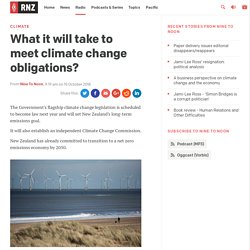
It will also establish an independent Climate Change Commission. New Zealand has already committed to transition to a net zero emissions economy by 2050. Is climate change the cause of rising world hunger? Deforestation in the Amazon is shooting up, but Brazil’s president calls the data ‘a lie’ Deforestation is shooting up again in the Brazilian Amazon, according to satellite monitoring data.
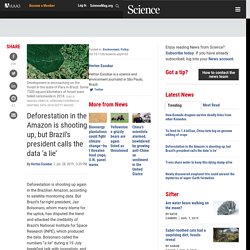
But Brazil’s far-right president, Jair Bolsonaro, whom many blame for the uptick, has disputed the trend and attacked the credibility of Brazil’s National Institute for Space Research (INPE), which produced the data. Bolsonaro called the numbers “a lie” during a 19 July breakfast talk with journalists, and suggested INPE Director Ricardo Galvão was “at the service of some [nongovernmental organization].”
“With all the devastation you accuse us of doing and having done in the past, the Amazon would be extinguished already,” he said. His comments triggered a fierce backlash from the scientific community, which feels increasingly under siege from the Bolsonaro administration. INPE, a public research institute based in São José dos Campos, has been tracking deforestation in the Amazon through satellite images since the 1970s. Other scientists defend INPE’s numbers. Sun-warmed surface seawater drives fast melt in Ross Ice Shelf region.
Research involving Kiwi scientists has shown surface seawater, warmed by the sun, is a key factor in why the base of part of the Ross Ice Shelf (RIS) in Antarctica has melted faster than average.
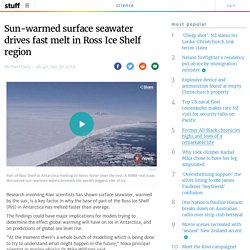
The findings could have major implications for models trying to determine the effect global warming will have on ice in Antarctica, and on predictions of global sea level rise. "At the moment there's a whole bunch of modelling which is being done to try to understand what might happen in the future," Niwa principal scientist in marine physics Dr Mike Williams said. "Some of the science we've done hasn't been incorporated into those kind of studies and models. That's what we're really interested in talking about," he said. Overview of likely climate change impacts in New Zealand.
This page provides an overview of likely climate change impacts in New Zealand.
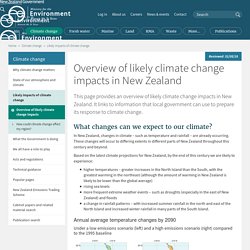
It links to information that local government can use to prepare its response to climate change. What changes can we expect to our climate? In New Zealand, changes in climate – such as temperature and rainfall – are already occurring. These changes will occur to differing extents in different parts of New Zealand throughout this century and beyond. Climate change is a global problem - and one we can all help tackle.
Last updated 05:00, March 31 2018 Caption Settings Dialog Beginning of dialog window.
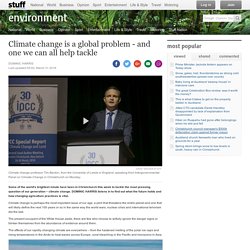
Facts – Climate Change: Vital Signs of the Planet. › en español Global climate change has already had observable effects on the environment. Glaciers have shrunk, ice on rivers and lakes is breaking up earlier, plant and animal ranges have shifted and trees are flowering sooner. Effects that scientists had predicted in the past would result from global climate change are now occurring: loss of sea ice, accelerated sea level rise and longer, more intense heat waves. Taken as a whole, the range of published evidence indicates that the net damage costs of climate change are likely to be significant and to increase over time. Scientists have high confidence that global temperatures will continue to rise for decades to come, largely due to greenhouse gases produced by human activities. More stuff = more climate change? - Science journal for kids/teens. The climate visualisations that leave no room for doubt or denial.
West Coast communities warned they must move from flood and erosion zones. Last updated 10:42, September 13 2018 Caption Settings Dialog Beginning of dialog window.

Escape will cancel and close the window. This is a modal window. This modal can be closed by pressing the Escape key or activating the close button. Video will play in 5 secondsPlay Now! Stop Who will pay for residents of the West Coast town Hector to "relocate" is one issue, whether or not they will leave is another. Residents in a small West Coast town have paid more than $10,000 each for protection from the sea, but experts say they will still have to leave their homes.
The Future of Storms? Are powerful hurricanes like Harvey and Irma a sign that climate change is beginning to affect our weather? The real effects of climate change: whether it's rising seas, record temperatures, or vanishing rivers, the impact of climate change is already being felt around the globe. Global Warming: 2018 Articles, Facts, Causes & Effects.
Global warming is the term used to describe a gradual increase in the average temperature of the Earth's atmosphere and its oceans, a change that is believed to be permanently changing the Earth’s climate.
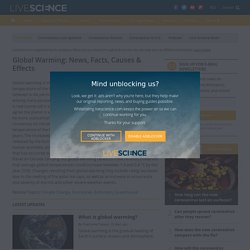
There is great debate among many people, and sometimes in the news, on whether global warming is real (some call it a hoax). But climate scientists looking at the data and facts agree the planet is warming.While many view the effects of global warming to be more substantial and more rapidly occurring than others do, the scientific consensus on climatic changes related to global warming is that the average temperature of the Earth has risen between 0.4 and 0.8 °C over the past 100 years. Related Topics: Climate Change, Hurricanes, Extinction, Greenhouse Look, we get it: ads aren't why you're here, but they help make our original reporting, news, and buying guides possible.
Whitelisting livescience.com keeps the power on so we can continue working for you. Thanks for your support. Global Warming. Climate Change. Evidence for climate change. This page has information on what climate change is, how we know it is happening, and what this might mean for the future. What is climate change? Earth’s atmosphere is made up of oxygen, a large amount of nitrogen and a small percentage of greenhouse gases, such as carbon dioxide and methane. Greenhouse gases act like a blanket around the Earth. The Greenhouse Effect - Causes of the Greenhouse effect.
What is the Green house effect ? The Earth is kept warm by it’s atmosphere, which acts rather like a woolly coat – without it, the average surface temperature would be about -18 degrees Centigrade. Heat from the sun passes through the atmosphere, warming it up, and most of it warms the surface of the planet. As the Earth warms up, it emits heat in the form of infra-red radiation – much like a hot pan emits heat even after it’s taken away from the cooker.
Some of this heat is trapped by the atmosphere, but the rest escapes into space. The so-called “greenhouse gases” make the atmosphere trap more of this radiation, so it gradually warms up more than it should, like a greenhouse (although a greenhouse actually does this by stopping warm air rising and escaping from it). QUICK ANSWERS TO TOUGH QUESTIONS ABOUT CLIMATE CHANGE.